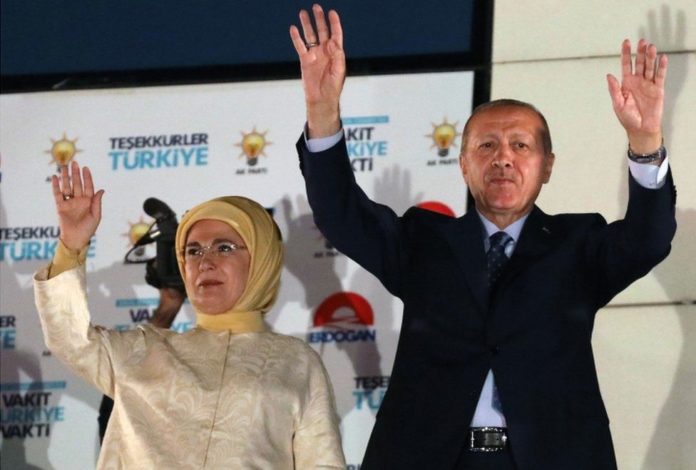Elections were held in Turkey on June 24, 2018. It was the first time in the national/ political history of Turkey that presidential as well as parliamentary elections were held simultaneously. It was paradigm shift in its ongoing socio-economic and geopolitical system by adopting presidential mode of democracy instead of parliamentary. It provided fair leveling field for all the candidates of presidency as well as parliament. Elections were held in a free, fair and transparent manner.
Around 60 million people in the Turkish electorate voted for the country’s executive president and for the 600-seat parliament. Incumbent Turkish President Recep Tayyip Erdogan won the presidential election and gained new executive powers. Western media is projecting his victory as “one man rule”, on the contrary it would not be a one man rule because there are certain check and balances and separation of powers mechanism/ procedures in Turkish Constitution and it the “real custodian” of the “civil liberties” and “human rights”.
The figure-l shows margin of Recep Tayyip Erdogan victory.
Presidential Election 2018
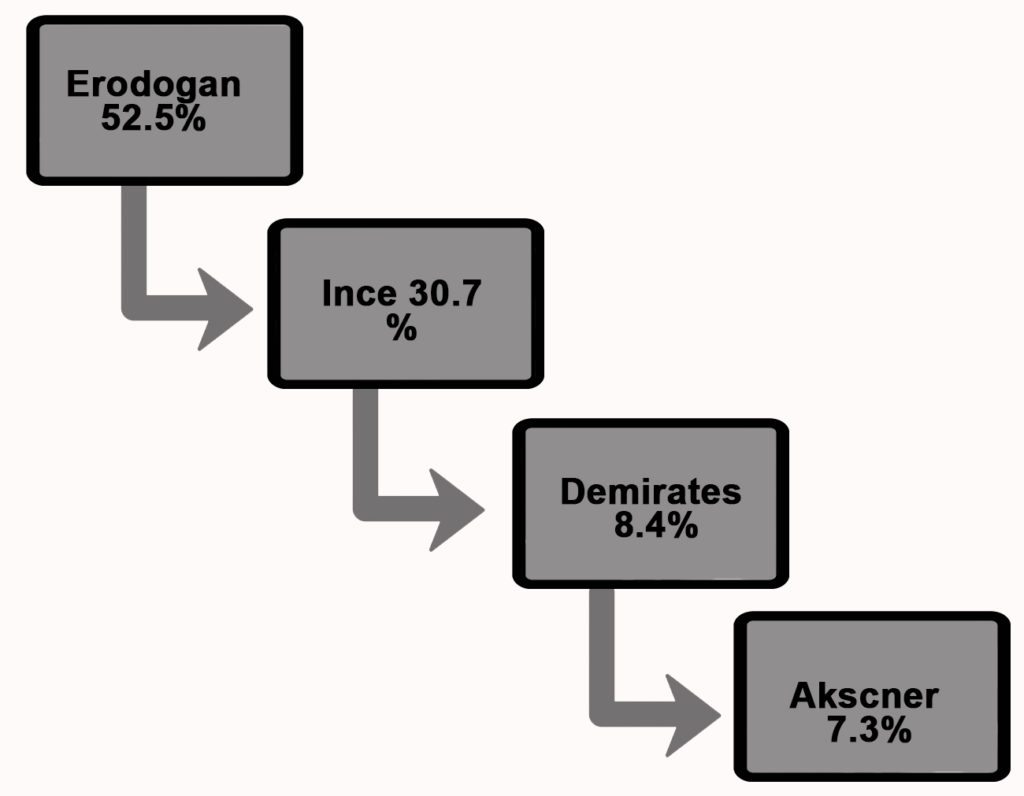
To achieve victory in the presidential election and majority in parliament politics of alliances was the main feature of recently held presidential as well as parliamentary elections held in Turkey. There were two main alliances for both the elections which are given below as:-
The figure-II illustrates that People’s Alliance gained more votes than Combined Opposition’s National Alliance and won both the elections despite very high expectations of the west for Turkish opposition which were based on exaggerations. Ballot decided the victors and afterwards, opposition and the west must respect free will of the Turkish people.
Political Alliances
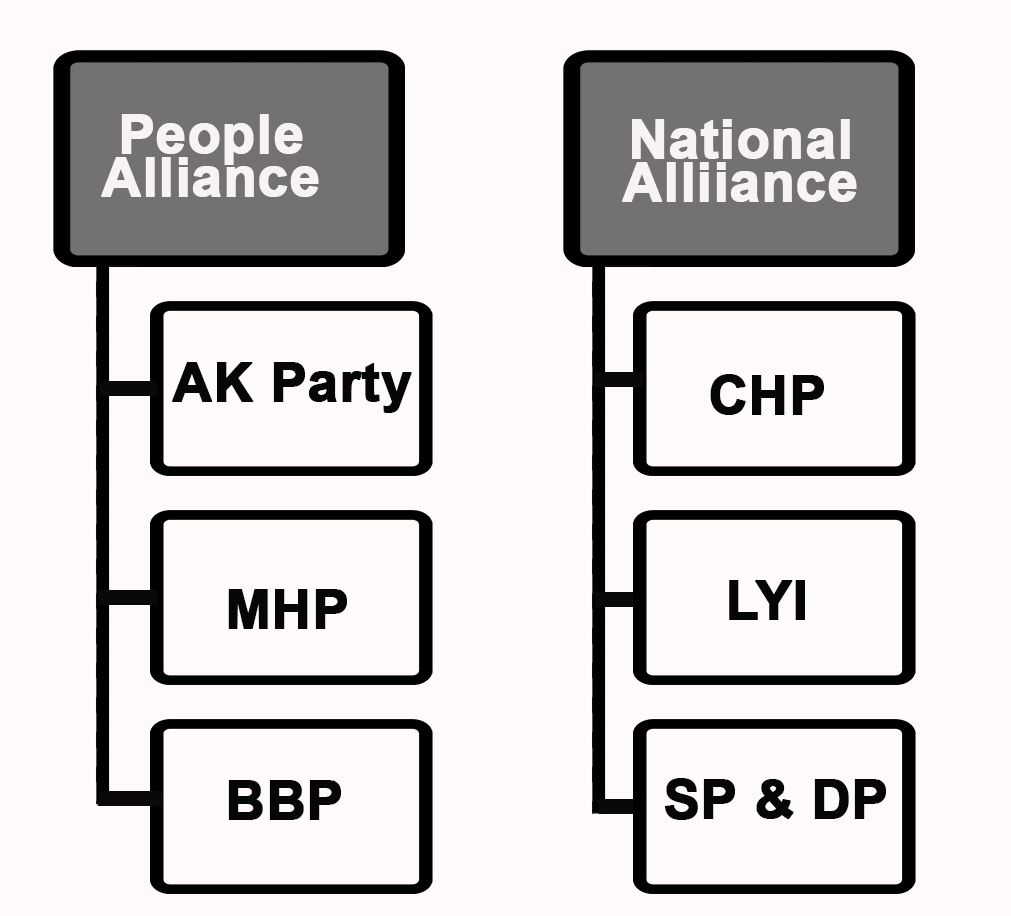
Critical analysis of both elections revealed that turnover was approximately 87 percent in which overseas Turkish people played an important role in the victory of Erdoğan and his political party AKP (Justice and Development Party).
It is evident from the above figure-III that Erdoğan’s AKP (Justice and Development Party) gained lesser majority than expectations with 42.5 percent of the vote. It was decrease of more than 7 percent since November 2015 due to which it succeeded to secure only 295 seats for the AKP in the parliament of 600 seats, short of the 301 needed for a majority. AKP’s ally the MHP (Nationalist Action Party) received 11.1 percent of the vote and obtained 49 seats in parliament, compensating somewhat for AKP’s poor performance.
The opposition parties headed by the CHP (People’s Republican Party) showed poor performance by only gaining 22.6 percent. It was also fell short of the 25 percent CHP won in the November 2015 elections. Its electoral ally, the newly formed İyi (Good) party, led by Meral Akşener, won an impressive 10 percent of the vote in its first-ever election. These two parties will have 146 and 43 seats in parliament, respectively. The mostly Kurdish HDP (Peoples’ Democratic Party) contested the elections on its own, and managed to pass the 10 percent threshold for entering parliament, winning 11.7 percent votes.
The Organization for Security and Cooperation in Europe (OSCE) monitored both the elections in Turkey and raised only “nominal objections” with special reference to “media coverage”, overseas voters accounting and some administrative flaws because of human limitations on the day of elections. On the whole, elections were free, fair and transparent which showed the real strength of “Turkish model of governance” which is purely based on immense social development and human values. It also showed levels of maturity, tolerance, political wisdom and rational choice of its people who voted for socio-economic prosperity, security, stability, peace and harmony. Although the Western media has projected a clear-cut division in Turkish social fabric after these elections between liberals and religious parties but thanks God, leaders and people of Turkey are mature enough to follow the path of peaceful co-existence and tolerance in the days to come.
According to Turkish Constitution now it has “Presidential Form of Democracy” in the country where elected president has various executive powers which are given below as:-
Real Picture of the Results
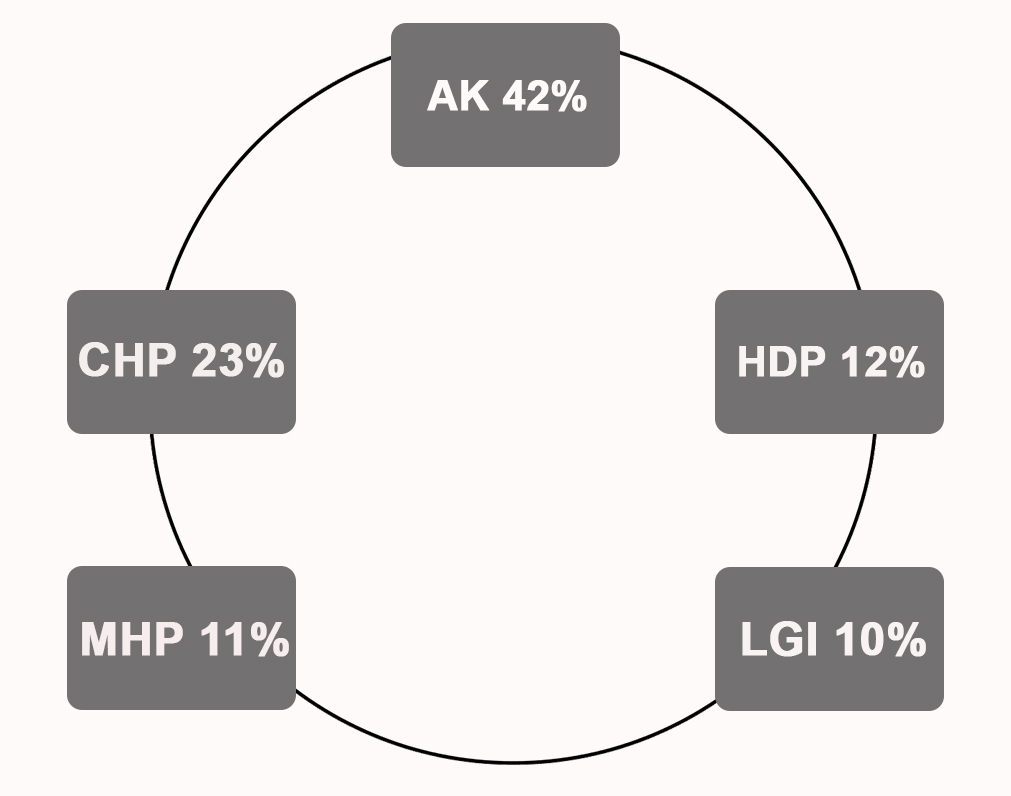
Some critics argue that Turkey’s new system i.e. Presidential Democracy lacks checks and balances. But it is based on wrong assumptions. On the contrary, executive presidency will remove all irritants in its economic and security systems.
Biggest Issues of Elections 2018
The recently held presidential as well as parliamentary elections were contested on various issues but recovery of national economy, sustainable development, reduction in unemployment rates, controlling of high inflationary trends i.e. 10-12 percent and the last but not the least, stability of Turkish Lira were the main economic issues.
There were also certain political issues which were not confined to political stability, good governance, purity of the delivery system, lifting of emergency and of course consolidation of free and fair political system.
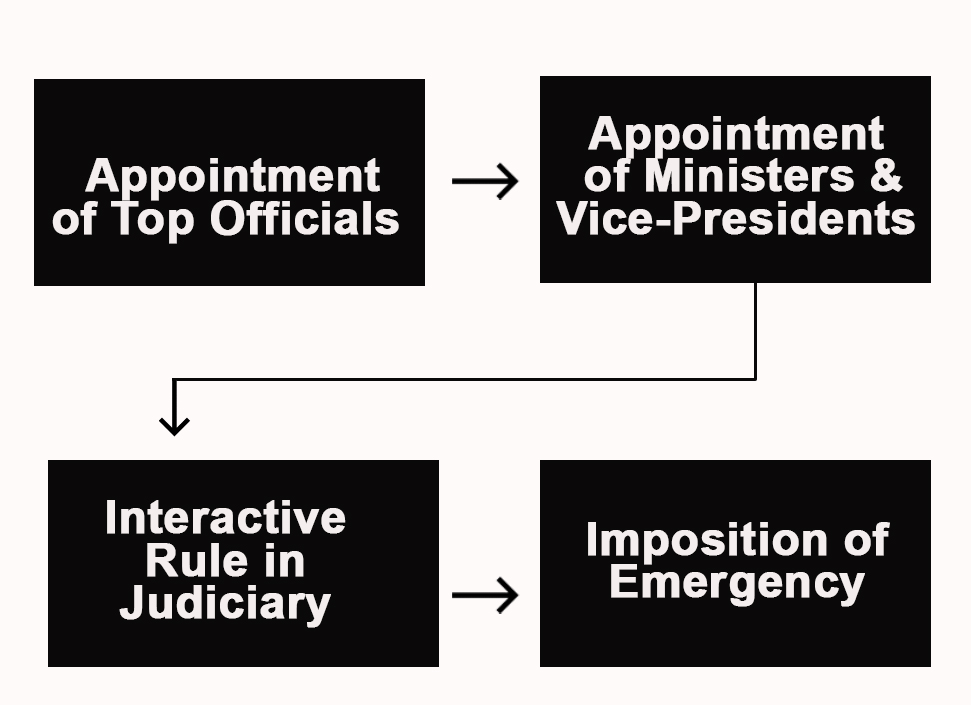
Issues related to foreign policy were also one of the main concerns of the political parties as well as its people. Security parameters in Syria, engagement with European Union and Turkey’s active role in OIC and Middle East were also raised during election campaigns. Terrorism was another key issue, as Turkey faces attacks from Kurdish militants and the jihadists of the Islamic State group.
According to Turkish authorities, almost half of Turkey’s eligible expatriate voters took part in the presidential and parliamentary elections 2018. More than 1.4 million people of Turkish eligible voters living in Germany voted in the elections.
Erdogan’s main focus of election campaigns was stability of the system, internal & external security, total transformation of the existing system of delivery, good governance and above all quick response to any expected or emerging socio-economic crisis in the country after elections 2018. He and his political alliance gained decisive majority in the elections.
The main opposition Republican People’s Party (CHP), the newly-formed centre-right Good Party (IP), the centre-right Democratic Party (DP) and the Islamist Felicity Party (SP) formed an unexpected electoral coalition called the National Alliance.
Despite their fundamental differences, all four parties constituted into National Alliance and contested the elections 2018.
| Turkey’s Expats | Total |
| Germany | 1, 400,000 |
| France | 340,000 |
| Netherlands | 250,000 |
| Austria | 105,000 |
| UK | 100,000 |
| Ballot boxes in 123 missions in 60 countries | Voting: 7-19 June |
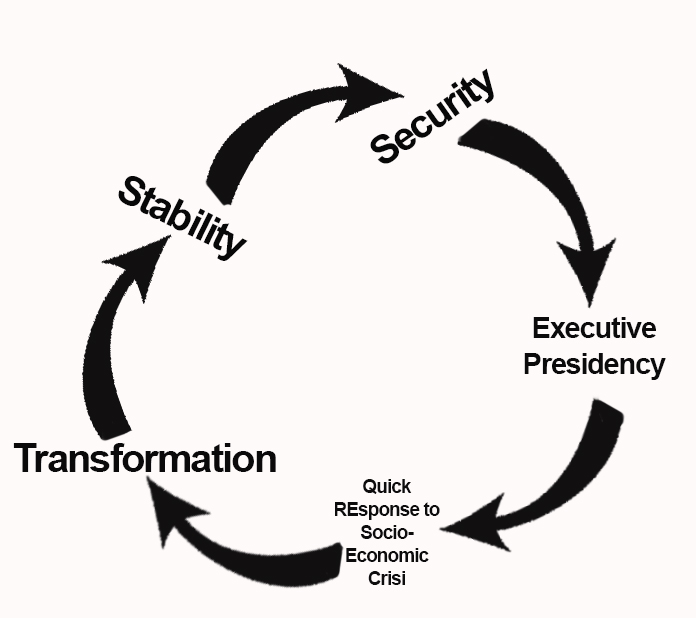
Presidential election was contested on the burning issues and choice between stability and uncertainty, executive presidency and the separation of executive, legislative, and juridical powers; the independence and impartiality of the judiciary; the independence of regulative institutions such as the Central Bank; decentralisation and equal citizenship rights for all sections of the population.
Results showed that Turkey is larger than any specific personality. With its history, modernity, and dynamism, Turkey is a complex, plural, and resilient society that cannot be reduced to a leader, an identity, or an ideology. Turkey strongly believes in “shared values”. In a nutshell, the People’s Alliance, formed by the ruling Justice and Development Party (AKP) and the Nationalist Movement Party (MHP) campaigned elections with the motto of “Strong Government, Strong Parliament” in reference to the implementation of the executive-presidential system. On the contrary, The Nation Alliance, formed by the Republican People’s Party (CHP), İYİ (Good) Party, and Felicity Party (SP), underlined the importance of the parliamentary system by strengthening it through democracy, rule of law, and human rights.
Political-Achievements-of-Erdogan
It is bitter reality for his political opponents that Erdogan has never lost an election during his political life after he founded Justice and Development Party (AKP). Afterwards, AK won 5 general elections, 3 local elections, 3 referendums and 1 presidential election since 2002. He has already made history by becoming the longest-serving leader in modern Turkish political history. The AK Party also became the longest governing party in Turkey.
Socio-Economic-Achievements
Under Erdogan’s rule Turkey has achieved an increase in the national income per capita. Per capita income has increased from $3500 to $11000. GDP has been increased 400 percent and reached to $11000. Education budget has been increased from $ 8 billion to $35 billion which is now even greater than its national defense budget. Turkish economy has marched up to the 16th largest economy of the world from 110 before his rule. Budgetary deficit has been reduced to 0 percent from $47 billion and its allocations have been increased up to 300 percent. In case of social development, enrollment of students has been increased from 65,000 to 800,000. Education has been made free in schools and universities. Medical facility has been available free in government hospitals. Numbers of airports have been increased from 26 to 50 which has revolutionized its transport sector. There is no concept of water and electricity load shedding because of immense development in the fields of energy, and power. There are 35,000 scientific laborites in the country. Diversified but integrated socio-economic development for the last 20 years has forced Turkish people to show trust and vote again to Mr. Erdogan in 2018. These developments were seen by Erdogan’s supporters as a move towards founding “the new Turkey.”

Concluding-Remarks
In a fair and free held elections on June 24 2018 the incumbent Turkish President Recep Tayyip Erdogan won the presidential election and gained new executive powers to transform the system of governance and delivery in the country. His People’s alliance had comparative advantage over National alliance and ultimately won the race of presidency and majority in the parliament with total 600 seats. It was fierce tussle between new Turkey and old Turkey. It was a fair competition between good governance and non-functional system of delivery. It was a political fight between weak parliamentary system and strong executive presidency.
Keeping in view, the rapidly changing socio-economic, geopolitical and geostrategic emerging trends, there was an urgent need to overhaul the system of the government. To avoid the bureaucratic hurdles and quick response to all social ills and economic problems, an “executive presidency” was the need of the hour.
Now Turkey has entered into a new phase of shared value and prosperity after the presidential elections. One hopes that the long awaited dreams of socio-economic prosperity, political stability and security may be achieved through collective efforts.


